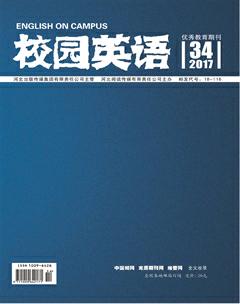The Character Images in the Captain American Ⅲ
Zhang+Shuang Zheng+Fang
【Abstract】Cooperative Principle is the key theory of pragmatics. This paper focus on the dialogues in the Captain American Ⅲ, composing abundant conversational implicatures in the view of violating the Cooperative Principle, to help audience have a better understanding of these figures.
【Key words】Cooperative Principle; character image; the Violation of Cooperative Principle
Introduction
Captain American Ⅲ has given a wonderful impression to the viewers relying on its special effects and super heroes. In this passage, the author uses the Cooperative Principle to analyze the dialogues and find out what kind of images it describes by the way of violating the Cooperative Principle.
1. Cooperative Principle
Cooperative Principle, coined by Grice in 1975, points out that when two speakers have an interaction, there should be a set of assumptions guiding the conduct to develop effective conversations. Grice divided it into four maxims called as Quantity, Quality, Relation and Manner respectively.
(1) Quantity: to make your answers as informative as is required and do not make your answer more informative than is required.
(2) Quality: to guarantee your answer convincing; do not say mendacious words and something lacking adequate evidence.
(3) Relation: to be relevant to the question.
(4) Manner: to be perspicuous and avoid vague, ambiguous but brief expression.
2. The Violation of Cooperative Principle
In the movie the Avengers were criticized by national governments for they had done harm to the innocent citizens. Thus, the government established some policies to control Avengers. Stark and others agreed with this control while the Captain Rogers was firmly opposed to. Thankfully, Stark and Rogers eliminated enemies together.
(1) Violating the maxim of quantity
In the battle of preventing the Captain American Rogers from running away, Vision hurt his teammate by accident. Stark asked him the reason.
Stark:“Vision, how did this happen?“
Vision:“I became distracted.”
Stark:“I didnt think that was possible.”
Vision:“Neither did I.”
Stark requested Vision to explain why he hurt his partner. Vision attributed this to his distraction rather than giving the actual reason, which flout the maxim of quantity by hiding some key information that is required. It suggests that Vision was unwilling to let Stark know his assistance to Rogers secretly, which incarnates the holy spirit of Vision as a super hero who could distinguish the wrong and right as well as uphold the justice at crucial moments.endprint
(2) Violating the maxim of quality
1) Deliberately say inveracious words
The Secretary of State asked Stark whether he had known where the Captain American was after he had an interaction with Sam.
The Secretary of State:“Stark, did he give you anything on Rogers? “
Stark:“No, he told me to go to hell. Im going back to the compound instead.”
In fact, Stark had got the message of Rogerss whereabouts, but he denied when requested by the Secretary of State, which apparently violated the maxim of quality and had two functions. For one thing, it reflects that Stark would like to prevent the Captain American from being discovered by the police. For another, the courageous and brave character figure is described because Stark was going to rescue Rogers on his own.
2) Deliberately say some words lacking adequate evidence
Stark came to Parkers home, chatting with Parker and his aunt May;
Parker:“What are you-what are you-what are you doing here?”
Stark:“Its about time we met. Youve been getting my e-mails, right?”
Parker:“Yeah. Yeah. Regarding the…”
Aunt May:“You didnt tell me about the grant.”
Parker:“About the grant.”
Stark:“The September Foundation.”
When Parker asked Stark what he was doing here, Stark replied that he came to talk with Parker about the September Foundation, which, actually, was a lie made up by Stark without any evidences. He just wanted to have a chance for interacting with Parker and persuaded him to join the Avengers. Hence, Stark flouts the maxim of quality by saying some unfounded words, which demonstrates Starks urgent need of talents to help him fight against the evils.
(3)Violating the maxim of relation
The Avengers members hided around the street, waiting for the appearance of enemies.
Rogers:“There is an ATM in the south corner, which means…”
Wanda:“Cameras.”
Rogers:“Both cross streets in one way?”
Wanda:“So compromise the escape routes. Means our guy doesnt care about being seen, he isnt afraid to make a mess on the way out.”
Rogers asked Wanda if the cameras were both on the same road intersection. Wanda ought to said “Yes” or “No”, but her answer was the assumption about the actions of enemies, which violates the maxim of relation. Hence, it embodies the powerful prediction ability and confidence of Wanda when a battle is coming.
(4) Violating the maxim of mannerendprint
Wanda was at a rest in the Avengers office, Vision restricting her freedom and not letting her out of the room.
Vision:“Wanda, no one dislikes you. Wanda.”
Wanda:“Oh. Thanks.”
Vision:“Youre welcome. No, its a… involuntary response in their amygdala. They cant help but be afraid of you.”
Wanda was having fruits while Vision suddenly told her that everybody favored her, which was an unconscious behavior. What Vision said sounds strange and ridiculous that no one knows what he wants to express exactly, which is a violation of the maxim of manner. He was nervous when he attempted to tell Wanda that she was restrictive. Therefore, he spoke vague and incoherent words, which reflects that he was kind and simple-hearted.
Summary
Through the analysis of the dialogues from the movie, several conversations violating the Cooperation Principle are easy to find. Not only does it reflects the speakers emotions and intention but also describes distinctive images. These figures can be concluded as competition convergence, adventurous, confident, self-expression. These qualities encourage American to be more brave, resolute and dountless.
References:
[1]侯紅锋.从影视作品浅谈美国文化价值观[J].电影文学,2014 (11).
[2]李红.从美国电影看其英雄主义文化特征[J].电影文学,2013 (03).
[3]童长涛.论美国文化价值观的影视传播[J].电影文学,2013 (07).
[4]王健平.论合作原则及其准则[J].华南师范大学学报,2016 (01).
[5]王淑琴.从美国影片看美国文化中的英雄主义[J].电影文学, 2013(17).
作者简介:
张爽(1984-),女,汉族,安徽安庆人,三峡大学外国语学院,硕士,讲师,研究方向:应用语言学。
郑方(1996-),男,汉族,湖北罗田人,三峡大学新能源材料与器件,本科。endprint

